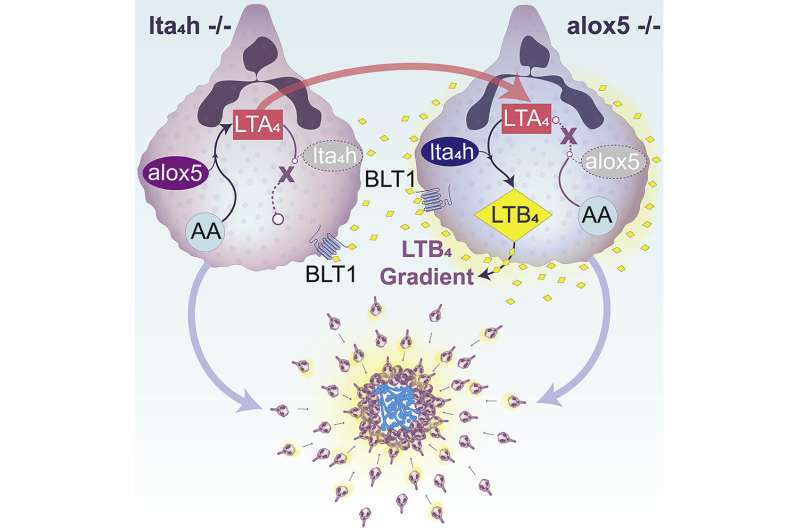
Bryan Hurley, Ph.D., an associate investigator in the Mucosal Immunology and Biology Research Center at Mass General for Children and an associate professor of pediatrics at Harvard Medical School and Daniel Irimia, MD, Ph.D., of the Center for Engineering in Medicine and Surgery at Massachusetts General Hospital and an associate professor of surgery at Harvard Medical School, are co-senior authors of a new study in iScience, titled Transcellular Biosynthesis of Leukotriene B4 Orchestrates Neutrophil Swarming to Fungi.
This study involves key collaboration with the laboratories of Michael Mansour, MD, Ph.D., of the Division of Infectious Diseases at Mass General and Charles Serhan, Ph.D., DSc, Director of the Center for Experimental Therapeutics and Reperfusion Injury, Department of Anesthesiology, Perioperative, and Pain Medicine at Brigham and Women’s Hospital.
What question were you investigating?
Neutrophils require the lipid mediator leukotriene B4 (LTB4) to swarm in response to a fungal target. LTB4 is synthesized by neutrophils as they swarm.
Since swarming is a collective behavior, we sought to determine whether neutrophils can cooperate to generate this mediator through a transcellular biosynthetic mechanism, and whether this process can rescue defective swarming behavior for mutant cells not capable of synthesizing LTB4.
What methods or approach did you use?
We employed an ex vivo platform for neutrophil swarming that incorporates microfluidics, genetically deficient mouse cells and targeted metabolipidomic analysis.
What did you find?
Neutrophils with mutations that disable synthesis of a lipid signal (LTB4) fail to swarm. If you mix two neutrophil populations, each with a different LTB4 synthetic enzyme deleted, cells within the mixture will overcome their inability to swarm by cooperatively generating LTB4 through transcellular biosynthesis.
What are the Implications?
By better understanding the mechanisms that drive neutrophil swarming, this critical inflammatory function can be therapeutically harnessed to better control infection response or potentially damaging auto-inflammatory processes.
More information:
Alex Hopke et al, Transcellular biosynthesis of leukotriene B4 orchestrates neutrophil swarming to fungi, iScience (2022). DOI: 10.1016/j.isci.2022.105226
Journal information:
iScience
Source: Read Full Article